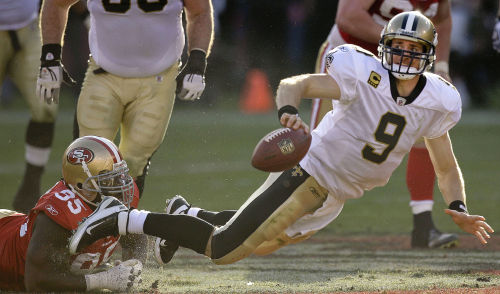Seafood board alternative bill gets mixed reviews
April 10, 2013
Detective named HPD’s Officer of the Year
April 10, 2013The potential that Louisiana’s Department of Wildlife and Fisheries could end up running the show upon whose stage the state will market its seafood is causing distress among some fishermen and fish dealers.
Asked why that potential is seen as a bad thing, some opponents of legislation submitted by Sen. Gerald Long (R-Winnfield) and Rep. Gordon Dove (R-Houma) point to elements of a deal struck last year with the New Orleans Saints as proof.
The contract with the Saints, as negotiated by the Louisiana Seafood Promotion and Marketing Board with the help of marketing firms it hired, closed out with seafood getting the short end of the stick, partisans say, specifically because of unprecedented LDWF interference. It was Barham who signed the contract with the Saints. Barham said in an interview last week that his attorneys said he was authorized. But present and former board members say he was not.
The language of the Long-Dove bill would give Barham – or whoever gets his job when Gov. Bobby Jindal’s term ends – the power to approve or disapprove the board’s executive director, who will “serve at the pleasure of the Secretary.”
Its wording makes all of that power retroactive. And some board members say they fear the reason for that is to protect Barham from repercussions of prior over-reaching.
An opinion from the Louisiana Attorney General makes clear that $30 million in seafood marketing money to fund these projects, paid out by BP to right effects of the 2010 Macondo well disaster, is not public but private money, resting as it does with the Louisiana Wildlife and Fisheries Foundation, a non-profit that aids LDWF in some of its education and habitat-restoration endeavors.
“As provided herein, the funding for these programs are grants, donations, or other forms of assistance from BP to the foundation(s) and do not constitute public funds,” the opinion states. “As a result LDWF serves only as advisor to the foundation(s) … this advisory role is a condition of the grants to the Foundations and these conditions are not contrary to Louisiana law or to public morals.”
Former board chairman Harlan Pierce said neither he, other board members nor board director Ewell Smith were included in the final decision by Barham to sign the contract with the Saints. Initially the contract said the Saints would have famous chefs cooking up Louisiana seafood in the broadcast booth during televised games, giving it national exposure. In addition the Saints would hang banners promoting Louisiana seafood in the Superdome. The total payoff for the Saints was $650,000. The Saints balked at the televised cooking, saying they did not think the networks would go along. Seafood promotion board members then questioned the value of the deal. Already in for a penny so ready to go in for a pound, however, the board agreed that the Saints would be paid $500,000 up front. The remainder would be paid after the end of the season, they said, to ensure performance.
Barham authorized the final payment, regardless.
“I was told Secretary Barham was going to sign it and I said I don’t agree with that,” Pierce said. “What is clear is we made a motion not to pay until after the Super Bowl so we could make sure our signs were in place. They paid even though our board said to wait.”
Records retained by board members tell a part of the Saints deal story.
On Sept. 14 the board, through Ewell Smith, addressed the failure of the final contract to guarantee on-air time that would promote Louisiana seafood.
“What is the contract under review is NOT what (a Saints representative) presented to the Board on September 7 … The way the deal was presented to the Board … was as a media purchase to get chefs and a representative into each home game to make a delivery of seafood to the broadcasters during the game and talk about Louisiana Seafood while live on the air.”
This, Smith protested, “ is the main part of the deal. This is what was sold to the board and how we justified the purchase. Anything that leads either of those two items open is not what the deal was the board approved.”
Attorneys for the LDWF made clear in messages to the promotion and marketing board regarding the Saints deal that in their opinion LDWF is and has been in charge.
“The Agreement was entered into by and between LDWF, representing the Seafood Promotion and Marketing Board (as a board that is housed within the Office of Fisheries) and the Saints,” says a memo from LDWF attorney Cole Garrett. “This is made clear in the first paragraph on the first page of the Agreement, which indicates the parties. Secretary Barham is a duly authorized representative of the LSPMB for the purposes of this Agreement and his signature is certainly sufficient for (the Louisiana Fish and Wildlife Foundation) to remit payment for satisfaction of obligations created by the Agreement. The Agreement has been executed and is in effect, I see no apparent need to modify this document or to add a signature for an entity that exists as a subsidiary of the department.”
If that is the case, some current and former board members ask, then why is the legislation necessary?
Barham, in testimony before a legislative committee last year, said himself that disagreement exists over who is in charge of the promotion aspect of Louisiana seafood.
The issue, he said, would eventually be sorted out by the legislature.
The remaining question now is the significance of the “retroactive” mention in the bill, and whether it is meant to cover Barham or others from actually overstepping their authority last year and in the early part of this year.
“What the industry is opposed to is it will make the industry completely impotent as far as being able to send and control their own money and message,” said Sarah Voisin, recently appointed to the board, whose late husband, Mike, was a founder. “This past year Barham completely stopped us in our tracks, and said no to things we had done for 30 years almost. The original Saints deal was supposed to buy us anywhere from $2 million to $10 million worth of advertising and would have been good. Because he didn’t know what he was doing, the deal was changed. This retroactive clause in the bill is what has really set everyone off because it implies that something was not right. Why was there a need for the retroactive clause? It brought up a red flag of what the need for that is if there is not something wrong. Barham has overstepped and didn’t have proper authority and could be in trouble. He was given the wrong information I am sure but it is his job to see that everything is done proper and this was not properly done. He did it wrong.”
New Orleans Saints quarterback Drew Brees eyes downfield as he’s tackled in a game against the San Francisco 49ers. A deal struck between the Saints and the Louisiana Seafood Promotion and Marketing Board and is the source of a bill proposed by local Rep. Gordon Dove and Sen. Gerald Long (R-Winnfield).











